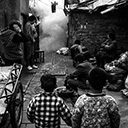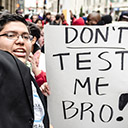
By now much of the world has heard of Toronto’s mayor Rob Ford. But the real story in Toronto is not Rob Ford. How did one of North America’s most diverse cities in one of the west’s most robust democracies come to elect a right-wing populist?

Under the New Deal order, unions not only sustained prosperity but ensured that it was shared. Since the 1970s, however, the attack on unions has reversed these gains. Today, both union membership and inequality stand roughly at 1920s levels.

Last week, the College Board announced changes to the Scholastic Aptitude Test because it had “become disconnected from the work of our high schools.” But can test reforms change the class and racial biases of U.S. college admissions?

Inequality is greater now than it has been at any time in the last century, and the gaps in wages, income, and wealth are wider in the United States than in any other democratic and developed economy. Yet we lack a clear and compelling account of how and why we arrived this point. Our current economic troubles have aimed a spotlight at our inequality problem, but they did not create it. What did?

Ricardo Seitenfus, a former OAS special representative, was dismissed after criticizing international meddling in Haiti’s 2010 election, less than a year after a devastating earthquake struck the country. In this interview, Seitenfus expands on his criticisms of the international presence in Haiti and describes the “silent coup d’etat” he witnessed.

Early in 2013, as Xi Jinping prepared to take over leadership of China, some high-profile Western analysts were cautiously optimistic about where the country was heading. But far from bringing a longed-for “easing” of controls on expression and civil society activities, the Year of the Snake often saw the ratcheting up of mechanisms of control and intimidation. As we move into the Year of the Horse, Jeffrey Wasserstrom brings together four legal experts to discuss.

This month’s “Manif pour tous” was most obviously against a law called Mariage pour tous (Marriage for All). But something bigger is stirring. Is it, as Le Monde put it, “The Awakening of Reactionary France”?

At the University of Illinois Chicago, striking faculty are recalling the founding mission of America’s great public universities.

Bill McKibben’s recent writing leaves an impression of the author as a highly effective leader among leaders in the U.S. climate movement. The portrait seems credible. Why, then, is McKibben at pains to repudiate it?

Nicholas Dawidoff’s Collision Low Crossers will stand as its era’s exemplary document of how the National Football League is consumed. And he has used it to write a story almost all about the coaches.

Japan’s wide-ranging new Secrets Act imperils the central tenets of the country’s democracy—the right to know, the right to a free press, the right to privacy. For many, the broad possibilities of the new law evoke memories of the 1930s, an era known in Japan as the “Valley of Darkness.”

A history of Dissent magazine, by Maurice Isserman.

Socialist Kshama Sawant’s election to the Seattle City Council in November 2013 made national news, a kind of “man bites dog” story that the media found shocking and irresistible. In fact, the United States has a long tradition of municipal socialism. One hundred years ago, about 1,200 socialists held public office in 340 cities.

Diane Ravitch’s Reign of Error speaks directly to the experiences of public school teachers who are tired of being labeled as failures for their inability to control the outcomes of standardized tests.

Readers of Dissent are unlikely to be newcomers to Wisconsin’s recent political saga. With oddball events unfolding week by week, however, they may easily have lost track. American conservatives have not forgotten.





















